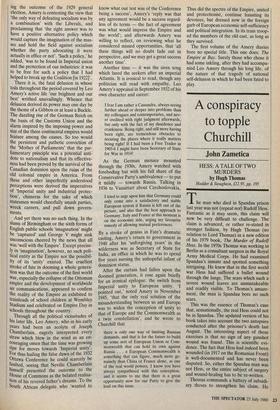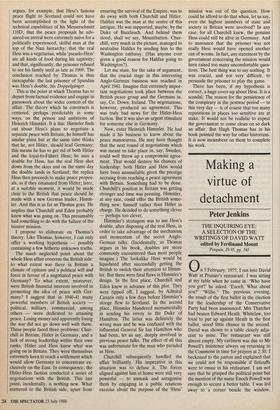A conspiracy to topple Churchill
John Zametica
HESS: A TALE OF TWO MURDERS by Hugh Thomas
Hodder & Stoughton, f12.95, pp. 195
The man who died in Spandau prison last year was not (repeat not) Rudolf Hess. Fantastic as it may seem, this claim will now be very difficult to challenge. The claim is advanced, or rather re-stated in stronger fashion, by Hugh Thomas (no relation to Lord Thomas) in a new edition of his 1979 book, The Murder of Rudolf Hess. In the 1970s Thomas was working in Berlin as a consultant surgeon in the Royal Army Medical Corps. He had examined Spandau's inmate and spotted something intriguing. He knew that in the first world war Hess had suffered a bullet wound through the lungs. The scars which such a severe wound leaves are unmistakeable and readily visible. To Thomas's amaze- ment, the man is Spandau bore no such scars.
This was the essence of Thomas's case that, sensationally, the real Hess could not be in Spandau. The updated version of his book takes into account the two autopsies conducted after the prisoner's death last August. The interesting aspect of these exercises is that no sign of any gunshot wound was found. This is scientific evi- dence. The fact that Hess had indeed been wounded (in 1917 on the Romanian Front) is well-documented and has never been disputed. So, either the Spandau man was not Hess, or the entire subject of surgery and wound-healing has to be re-written.
Thomas commands a battery of subsidi- ary theses to strengthen his claim. He argues, for example, that Hess's famous peace flight to Scotland could not have been accomplished in the light of the technical capabilities of his Messerschmitt 110D; that the peace proposals he adv- anced on arrival were extremely naive for a politically experienced, skilful man at the top of the Nazi hierarchy; that the real Hess was a vegetarian, while 'pseudo-Hess' ate all kinds of food during his captivity; and that, significantly, the prisoner refused to see his family until as late as 1969. The conclusion reached by Thomas is thus inescapable: the last prisoner of Spandau was Hess's double, his Doppelganger.
This is the point at which Thomas has to depart from factual evidence and engage in guesswork about the wider context .of the affair. The theory which he constructs is centered, perhaps predictably in some ways, on the person and ambitions of Heinrich Himmler. It is this: Himmler finds out about Hess's plans to negotiate a separate peace with Britain; he himself has similar plans but at the same time thinks that he, not Hitler, should lead Germany; this means he has to get rid of both Hitler and the loyal-to-Fiihrer Hess; he uses a double for Hess, has the real Hess shot down from the skies and on the same day the double lands in Scotland; the replica Hess then proceeds to make peace propos- als, as if they emanated from Hitler; later, at a suitable moment, it would be made clear to the British that peace should be made with a new German leader, Himm- ler. And this is as far as Thomas goes. He implies that Churchill and Eden probably knew what was going on. This presumably had something to do with the failure of the bizarre mission.
I propose to elaborate on Thomas's theory. Like Thomas, however, I can only offer a working hypothesis — possibly containing a few hitherto unknown truths.
The much neglected point about the whole Hess affair concerns the British side: to what extent was there in Britain a climate of opinion and a political will and force in favour of a negotiated peace with Germany? To what extent, moreover, were British financial interests involved in promoting the idea of peace with Ger- many? I suggest that in 1940-41 many powerful members of British society political, military, commercial, among others — were dedicated to attaining peace. Losing money and apparently losing the war did not go down well with them.
These people faced three problems: Chur- chill in Britain, Hitler in Germany, and a lack of strong leadership within their own ranks. Hitler and Hess knew what was going on in Britain. They were themselves extremely keen to reach a settlement which would allow Germany to concentrate ex- clusively on the East. In consequence, the Hitler-Hess faction conducted a series of negotiations with the British. This last point, incidentally, is nothing new. What mattered to the British side, apart from ensuring the survival of the Empire, was to do away with both Churchill and Hitler. Halifax was the man at the centre of this intrigue. He was supported, maybe, by the Duke of Buccleuch. And behind them stood, shall we say, Mountbatten. Chur- chill, very much in the picture, managed to neutralise Halifax by sending him to the Washington embassy. (Has anyone ever given a good reason for Halifax going to Washington?).
Let me state, for the sake of argument, that the crucial stage in this interesting Anglo-German business was reached in April 1941. Imagine that extremely impor- tant negotiations took place between the British peace group and the Germans in, say, Co. Down, Ireland. The negotiations, however, produced no agreement. This was truly bad news for the Hitler-Hess faction. But it was also an urgent stimulant for someone else in Germany.
Now, enter Heinrich Himmler. He had made it his business to know about the peace manoeuvres. He may have thought that the next round of negotiations which was meant to take place in, say, Sweden, could well throw up a compromise agree- ment. That would destroy his chances of leadership: both Hitler and Hess would have been unassailable given the prestige accruing from reaching a peace agreement with Britain. Something had to be done. Churchill's position in Britain was getting stronger and time was pressing. Himmler, at any rate, could offer the British some- thing new: himself rather than Hitler in charge. He decided to do something clever — perhaps too clever.
Himmler's stratagem was to use Hess's double, after disposing of the real Hess, in order to take advantage of the mechanism and momentum of the secret Anglo- German talks. (Incidentally, as Thomas argues in his book, doubles are more commonly encountered than most people imagine.) The lookalike Hess would be liquidated after successfully getting the British to switch their attention to Himm- ler. But there were fatal flaws in Himmler's design. In the first place, Churchill and Eden knew in advance of this plot. They were tipped off, I suggest, by Admiral Canaris only a few days before Himmler's stooge flew to Scotland. In the second place, Himmler blundered monumentally in sending his envoy to the Duke of Hamilton. The latter was definitely the wrong man and he was confused with the influential General Sir Ian Hamilton who had been, let us say, deeply involved in previous peace talks. The effect of all this was unfortunate for the man who paraded as Hess.
Churchill subsequently handled the affair brilliantly. His imperative in this situation was to defuse it. The forces aligned against him at home were still very powerful — to unmask and antagonise them by engaging in a public relations exercise about the purpose of the 'Hess' mission was out of the question. How could he afford to do that when, let us say, even the highest members of state and society in Britain were involved? In any case, for all Churchill knew, the genuine Hess could still be alive in Germany. And to announce that the prisoner was not really Hess would have opened another can of worms. In fact, any statement by the government concerning the mission would have raised too many uncomfortable ques- tions. The best thing was to say nothing. It was crucial, and not very difficult, to persuade the prisoner to play the game.
There has been, if my hypothesis is correct, a huge cover-up about Hess. It is a scandal. The reason for the persistence of the conspiracy in the postwar period — to this very day — is of course that too many reputations in places too sensitive are at stake. It would not be realistic to expect the government to come clean on so dark an affair. But Hugh Thomas has in his book pointed the way for other historians. It is now incumbent on them to complete his work.















































 Previous page
Previous page